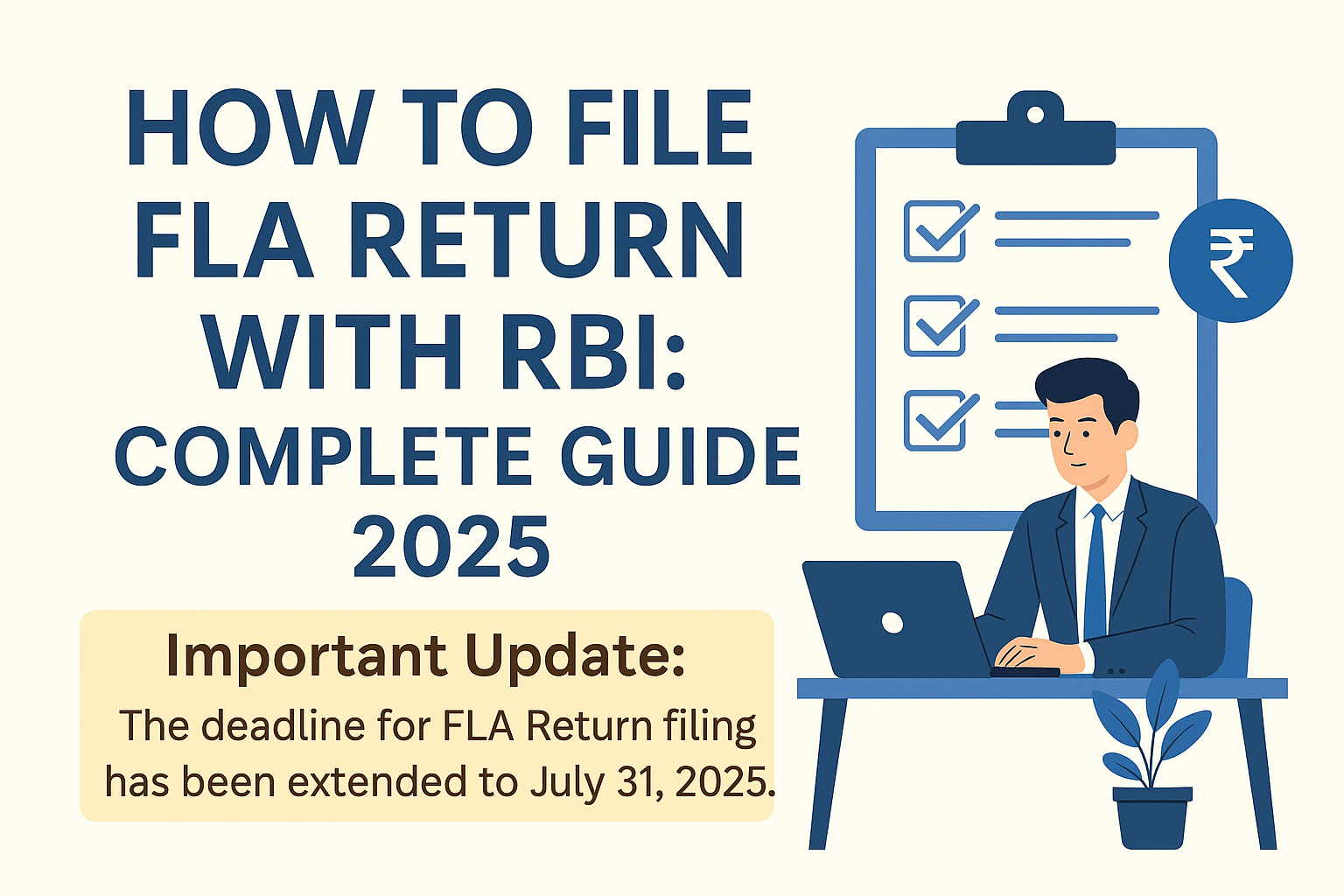How to File FLA Return with RBI 2025: Complete Guide & Extended Deadline
Everything you need to know about Foreign Liabilities and Assets (FLA) Return filing – Updated for July 2025 deadline extension
Table of Contents
What is FLA Return?
The Foreign Liabilities and Assets (FLA) Return is a mandatory annual submission required by the Reserve Bank of India (RBI) under the Foreign Exchange Management Act (FEMA), 1999. This return must be filed by Indian companies that have received foreign direct investment (FDI) or have made overseas direct investments (ODI). The FLA Return helps RBI monitor and track foreign exchange transactions and compliance with FEMA regulations.
Who Needs to File FLA Return?
The following entities are required to file FLA Return with RBI:
- Indian companies that have received Foreign Direct Investment (FDI)
- Indian companies that have made Overseas Direct Investment (ODI)
- Companies with foreign liabilities or assets as per FEMA regulations
- Indian companies with foreign branches or subsidiaries
Key Deadlines and Extension
Original Deadline vs Extended Deadline
- Original Deadline: June 30, 2025
- Extended Deadline: July 31, 2025
- Filing Period: For the financial year 2024-25
Step-by-Step Guide to File FLA Return
Step 1: Access the RBI Portal
Visit the official RBI portal for FLA Return filing:
Access RBI FIRMS PortalNote: You need to register on the FIRMS (Foreign Investment Reporting and Management System) portal if you haven’t already.
Step 2: Login/Register
- If you’re a new user, click on “Register” and complete the registration process
- Existing users can directly login using their credentials
- Keep your Company Registration Number (CRN) and other company details handy
Step 3: Select FLA Return
- After logging in, navigate to the “Returns” section
- Select “FLA Return” from the dropdown menu
- Choose the appropriate financial year (2024-25)
Step 4: Fill Required Information
Complete the following sections:
- Company Details: Basic company information
- Foreign Liabilities: Details of FDI received
- Foreign Assets: Details of ODI made
- Financial Information: Balance sheet items
Step 5: Upload Supporting Documents
Upload the following documents:
- Audited Balance Sheet
- Profit & Loss Account
- Director’s Report
- Auditor’s Report
- Any other relevant documents
Step 6: Review and Submit
- Carefully review all entered information
- Ensure all mandatory fields are filled
- Submit the return before the deadline
- Take a printout of the acknowledgment
Important Documents Required
| Document Type | Description | Mandatory |
|---|---|---|
| Audited Financial Statements | Balance Sheet, P&L Account for FY 2024-25 | Yes |
| Director’s Report | Annual Director’s Report | Yes |
| Auditor’s Report | Statutory Auditor’s Report | Yes |
| FDI/ODI Details | Transaction-wise details | If applicable |
| Board Resolution | Resolution authorizing the filing officer | Yes |
| Digital Signature Certificate | Valid DSC of authorized signatory | Yes |
Additional Filing Requirements
Digital Signature Certificate (DSC) – Critical Requirement
One of the most important requirements that companies often overlook is the Digital Signature Certificate (DSC). The FLA Return must be digitally signed by an authorized person, typically:
- Managing Director or Director of the company
- Company Secretary (if appointed)
- Chief Financial Officer
- Any other person authorized by the Board of Directors
Key Points about DSC:
- The DSC must be valid and not expired
- It should be registered with the RBI portal
- The signatory must be authorized through a Board Resolution
- Without a valid DSC, the return cannot be submitted
Common Mistakes to Avoid
- Missing the extended deadline of July 31, 2025
- Incomplete or incorrect company details
- Not uploading mandatory supporting documents
- Errors in foreign investment calculations
- Not updating changes in company structure
Penalties for Non-Compliance
Warning: Non-filing or late filing of FLA Return can result in penalties under FEMA. The RBI may impose monetary penalties and other regulatory actions. It’s crucial to file within the extended deadline of July 31, 2025.
Need Help?
If you encounter any technical issues or need clarification on FLA Return filing, you can:
- Contact RBI helpdesk through the FIRMS portal
- Email: fema@rbi.org.in
- Consult with a qualified Company Secretary or compliance professional
Frequently Asked Questions (FAQ)
What is the penalty for late filing of FLA Return?
The RBI can impose monetary penalties under FEMA for late filing or non-filing of FLA Return. The penalty amount varies based on the delay period and company’s turnover. It’s crucial to file within the extended deadline of July 31, 2025.
Can I file FLA Return without a Digital Signature Certificate?
No, FLA Return filing requires a valid Digital Signature Certificate (DSC) from an authorized person like MD, Director, CS, or CFO. Without DSC, the return cannot be submitted.
What is the difference between FLA Return and Annual Performance Report (APR)?
FLA Return is filed by Indian companies with foreign investments, while APR is filed by foreign companies with Indian operations. Both are mandatory under FEMA but serve different purposes in foreign exchange monitoring.
Is FLA Return filing mandatory for all companies?
No, only Indian companies that have received FDI, made ODI, or have foreign liabilities/assets as per FEMA regulations need to file FLA Return. Companies without any foreign exchange transactions are not required to file.
Disclaimer
Disclaimer: The author shall not be liable for any direct, indirect, incidental, or consequential damages arising from the use of or reliance on the information provided herein. Users are advised to consult professionals before acting on any information.
Read more about FCGPR
